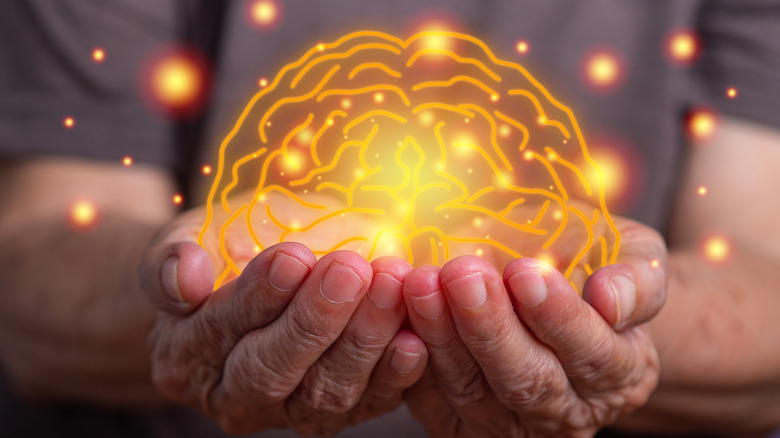14 Signs Your Brain Is Aging Faster Than You Are
Ever had a "senior moment" when you can't remember what you were planning on doing when you headed into the kitchen, or the name of your best friend's spouse, or who you have an appointment with at 2 p.m.? Whether you're in your 20s, 40s, 60s or beyond, these occasional brain hiccups are normal and usually nothing to worry about (via Mayo Clinic). But if they happen persistently and you notice any of the other worrisome symptoms, it's possible that your brain is aging faster than you are.
You might immediately think that dementia is setting in when you have a string of cognitive lapses, but don't panic. According to the American Association of Retired Persons (AARP), a number of other health issues cause symptoms similar to dementia, including an untreated infection, medication interactions or side effects, sleep problems, and dehydration. So if you find yourself being more forgetful than usual, go to your doctor and get to the bottom of what's going on.
Whatever the cause of your symptoms, taking steps to boost your brain health is always a good idea (via Kaiser Permanente Washington Health Research Institute). Stay physically and socially active. Eat healthy foods. Keep learning new things, stay positive, and set aside all the stereotypes you've heard of what aging is supposed to be like, says Harvard Health Publishing. Every person's experience is unique. That said, there are some signs you can watch out for that may indicate your brain is aging at an accelerated rate. Let's dig in further.
You can't smell the roses anymore, or taste the guacamole
Some loss of smell and taste is normal as you age (via the Mayo Clinic), but the symptoms can also signal health issues, only one of which is a prematurely aging brain affected by diseases such as Parkinson's or Alzheimer's. Some other potential causes are obvious — you have a cold, the flu, allergies, COVID-19, or are receiving cancer treatments. Certain medications can cause these symptoms, as can dental problems and smoking cigarettes.
Losing your ability to smell and taste may seem like a minor problem, but those senses play a big role in how appetizing foods seem. Therefore, having these senses diminished can lead to poor nutrition. For instance, the loss might make you more heavy handed using salt or sugar as you try to make foods more appealing, and that's not good for your health. And let's not forget safety: Your sense of smell alerts you to hazardous smells in your home, so make sure your smoke and gas detectors are in working order (via the National Institute on Aging).
You're walking slower than you used to
Changes in your gait may be a sign that your brain is aging faster than the rest of you, especially if you're also experiencing a declining ability to think clearly. Those were the findings of a study published in JAMA Network Open that evaluated the gait speed, memory, and verbal skills of more than 16,800 healthy older people in the United States and Australia over a seven-year period. Assessments were done at the start of the study and at years one, three, five, and seven, and participants who experienced declines in both gait speed and memory were at increased risk of dementia. In fact, the study found that measuring both gait speed and memory loss may be the best way to predict potential dementia.
While many gait studies focus on older adults, a study done in New Zealand followed about 900 participants from birth to age 45 (via Health). That study, also published in JAMA Network Open, found that how fast you'll walk in your 40s, and how quickly you'll age, can be predicted as early as age 3.
Learning new things is harder and takes longer
Learning challenges may be a red flag that your brain is aging faster than you are (via Cognition), but don't sell yourself — and your brain — short by expecting learning difficulties as you get older. According to the BBC, the pessimistic myth about the brain's ability to learn new things later in life dates back to the ancient Greeks, with Aristotle comparing the human memory to a wax tablet — soft and pliable at birth but brittle and tough as it ages.
Today's "SuperAgers" apparently don't buy into that myth, according to a study by scientists at Northwestern University Feinberg School of Medicine (via Medical News Today). SuperAgers are adults 80 years and older who have memories as good as people decades younger. The brains of SuperAgers shrink slower than those of other people, suggesting that cognitive decline is not an absolute given.
Dayna Touron at the University of North Carolina at Greensboro tested the learning abilities and memories of adults 60 and older (via BBC) compared to younger adults. They found that older adults tend to underestimate their ability to learn new things and remember what they've learned. As they use and depend on their memory less, their memory skills slowly decline — a clear instance of "use it or lose it."
Your memory is getting spotty
A normally aging brain will experience some mild short-term and long-term memory loss as you get older, says Medical News Today. Vision or hearing loss can limit your ability to remember things — though these are problems that for some can be improved by wearing glasses or hearing aids. Alcohol and recreational drug use also may contribute to memory loss, as well as chronic pain and several other health issues. Some memory problems can be treated and will improve.
Signs of major short-term and long-term memory loss include asking the same questions numerous times during a single conversation, getting lost in familiar places, or not being able to recall the day of the week or the season of the year (via National Institute on Aging). These symptoms may be a sign of a brain disorder such as Alzheimer's disease, which has no cure.
If you're worried about memory loss, it may be tempting to fall for the claims of over-the-counter products that promise to restore your memory, says Medical News Today, but resist those scams. No product is proven to resolve memory loss, and anything you try might cause unwanted interactions with the other medications you're taking.
You've been feeling like there's a black cloud over your head lately
About 17.3 million adults in the United States experience feelings of depression every year (via the Depression and Bipolar Support Alliance), and it's not necessarily a sign that your brain is aging prematurely. But it might be. Depression has been linked to an aging brain and cognitive decline in several ways. A study published in Psychological Medicine found that experiencing depression earlier in life speeds brain aging later in life — a good reason to take your mental wellbeing seriously and get treatment for depression or anxiety sooner rather than later (via ScienceDaily).
While depression and dementia are separate conditions, they have many of the same symptoms. That makes it difficult to separate the two, or to determine which came first, says Nature Reviews Neurology. A study done at the Washington University School of Medicine found that symptoms of depression may predict the onset of cognitive decline even before memory loss becomes noticeable (via Healthline).
If you or someone you know needs help with mental health, please contact the Crisis Text Line by texting HOME to 741741, call the National Alliance on Mental Illness helpline at 1-800-950-NAMI (6264), or visit the National Institute of Mental Health website.
You get more easily distracted these days
A normally aging brain loses receptors and neurons over time, which makes it harder to focus (via Harvard Health Publishing). Even the aches and pains of getting older can be distracting, and some medications also can affect concentration.
Brain World reported on a study done by McGill University and the University of California, San Francisco, that showed it's possible to train people — and rats, for that matter — to avoid distractions. But research done at the University of Toronto found benefits in older adults' propensity for distraction. Researcher Tarek Amer, now a psychology postdoctoral research fellow at Columbia University, told CBC/Radio-Canada that older adults tend to process both task-relevant and task-irrelevant information, whereas younger people tend to ignore or discard the task-irrelevant information. He says, "So if we give them a memory task ... that actually is testing memory for the irrelevant information ... we see that older adults actually outperform younger adults."
This finding could be useful in helping older adults cope with forgetfulness, he says. "For example, if there's information that they're supposed to remember ... then presenting that information as distraction can kind of serve as a rehearsal episode that can help older adults remember important information."
You struggle to think of common words
If difficulty locating the right word at the right time only happens occasionally and is just a minor annoyance, your brain is probably not aging prematurely. But loss of language function that occurs more persistently, including problems remembering common words, may be a symptom of primary progressive aphasia (PPA), according to the Cognitive Neurology and Alzheimer's Disease Center at Northwestern University.
PPA is caused by deterioration in the part of the brain that controls speech and language, usually in the left side of the brain (via University of California San Francisco's Weill Institute for Neurosciences). If you have PPA and can't think of a word, you might hesitate during conversations, or substitute a word that isn't exactly what you mean — such as saying floor instead of ground, or car instead of truck. You might mispronounce words, or arrange words in an incorrect order in sentences.
PPA is most often a symptom of Alzheimer's disease, and there's no cure, says the Cleveland Clinic. Speech therapy may help you maintain your language skills as long as possible, and learning sign language could give you an alternate way to communicate. If the underlying cause of PPA is Alzheimer's disease, some medications may be helpful.
You're experiencing some hearing loss
Hearing loss is common among people who are 50 and older, and it doesn't necessarily signal that your brain is aging faster than you are. But it does put you at higher risk of developing dementia, according to a study by researchers at John Hopkins Medicine. Specifically, the risk of developing dementia doubles if you have mild hearing loss, triples if you have moderate hearing loss, and is five times as likely with severe hearing loss. Struggling to hear puts a strain on your brain at the expense of other thinking and memory systems, and hearing loss may expedite atrophy in the brain and actually contribute to the onset of dementia.
Johns Hopkins is leading a study through the National Institute on Aging to determine if hearing aids can reduce the process of cognitive decline. Nearly 1,000 participants are divided into two groups, with one group getting hearing aids and the other group just getting education on aging. But no matter what the study finds, getting early help for even mild hearing loss is a good idea, says Frank Lin, director of the Cochlear Center for Hearing and Public Health at Johns Hopkins and leader of both the studies. Say hooey to any notions that hearing aids will make you feel or look older than you are: Hearing well may help you and your brain stay fit and engaged in life for years to come.
Your eyesight isn't so great
A study by the University of Washington and Kaiser Permanente Washington Health Institute found that participants who had glaucoma, diabetic retinopathy, or macular degeneration were more at risk of dementia than participants who didn't have those conditions (via Versant Health). Also, vision problems coupled with obesity, depression, hypertension, or diabetes put you at higher risk of dementia, according to a study published in the British Journal of Ophthalmology (via Medical News Today).
Getting regular eye exams is a good way to keep your eyes functioning at their optimal level, and it's also a great way to keep tabs on your whole body, says Brian Stagg, an ophthalmologist and retina specialist at the University of Utah's John A. Moran Eye Center (via AARP): "An eye exam is one of the few exams where, without doing blood tests, invasive imaging or surgery, we can actually look inside the body." Health issues that an eye exam can detect, even before symptoms become noticeable, include heart disease, high blood pressure, diabetes, and rheumatoid arthritis.
You're getting increasingly forgetful
Everybody forgets things, no matter what their age, and a number of things can contribute to an increase in forgetfulness (via Harvard Health Publishing) — only one of which is that your brain is aging faster than you are.
For example, are you getting enough sleep (via Centers for Disease Control and Prevention)? Most adults need at least seven hours of sleep a day, and getting too little restful sleep can contribute to forgetfulness. And are you taking any medications that could affect your memory? Some drugs used to treat colds and allergies, depression, heartburn, or an overactive bladder can affect your memory, according to Harvard Health Publishing. That said, it's time to talk to your doctor if you're forgetting to take your medications, pay your bills, eat, or bathe, or if forgetfulness is getting in the way of you enjoying daily life (via National Institute on Aging).
Your ability to multitask has declined
Researchers have found that adults who are 60 and older have more trouble switching from one task to another and back to the first task than younger adults (via WebMD). It's part of normal aging most of the time, but also can be an early sign of dementia (via Healthline). No matter what the cause, don't count on being a whiz at multitasking anymore and adjust accordingly. For example, remember that it may be harder for you to keep track of multiple lanes of traffic while you're driving, says an article published in Cerebrum, or to notice someone about to step off the curb in front of your car. Cognitive slowing accounts for a higher rate of automobile accidents among older adults.
A number of studies have shown that it's much less efficient to do multiple tasks at once rather than focusing on one task at a time, no matter what your age (via Discover). Too much multitasking may contribute to attention lapses, forgetfulness, and long-term memory problems.
You're getting more wobbly and are shuffling your feet when you walk
Both balance issues and a tendency to shuffle your feet can have a variety of causes, and they aren't necessarily signs of a prematurely aging brain. On the other hand, they can be red flags for some serious health issues that need prompt medical attention, including vascular disease, multiple sclerosis, and Parkinson's disease (via Geisinger). And yes, a study published in the Journal of Geriatric Physical Therapy found that balance and gait problems may signal very early Alzheimer's disease.
Shuffling your feet when you walk can be attributed to simple reasons, such as slippery floors, shoes or slippers that don't fit your feet, poor vision that makes it harder to see where you're going, or medication side effects (via DailyCaring). Pain or weakness in your joints and muscles can also be factors. But if none of these explanations fits your situation, it's best to get a thorough health checkup to rule out other possible causes.
You're losing stuff all the time
Does it feel like you're always searching for your misplaced phone, keys, glasses, jacket, book, or coffee cup? Join the crowd. But should you be worried? That depends. If you ultimately find the items in really bizarre places — like the freezer or oven — your brain may be aging faster than you are, and you might have something to worry about (via Johns Hopkins Medicine). Otherwise, PsychCentral recommends that you calm down, slow down, and implement a systematic plan for overcoming your absentmindedness.
Take it one commonly misplaced item at a time. For example, designate a place where you're always going to put your keys, and deposit them there every time you come home. Talk to yourself out loud — yes, really — about where you're putting them and how you're always going to remember to do that. Then do it. According to PsychCentral, talking out loud to yourself reinforces what you're doing and secures it better in your brain. You can even make up silly little songs to help you remember where you're putting things. Whatever works for you. If you're still misplacing things after taking these steps, just relax and remember that most lost things eventually turn up, especially if you misplaced them in your house.
It's getting harder to follow and participate in conversations
Your brain starts shrinking in your 30s, and the speed of shrinkage picks up once you are around 60 (via WebMD). That wrinkly outer layer of your brain, called the cerebral cortex, also gets thinner — and when it thins in the temporal lobe, behind your ears, it can affect the way you understand words, speak, read, and write. Some issues understanding and participating in conversations is normal as you age. A study published in the Journal of Audiology and Otology found that older adults may have trouble understanding conversations in noisy environments, possibly due to hearing challenges and a decreased ability to concentrate. Understanding people who are speaking quickly also becomes more difficult, compared to younger adults who experience almost no decrease in understanding as speech speed increases. But your brain may be aging faster than you are if you have serious problems understanding what people are saying, thinking of an answer, and putting words together for your reply, says the Alzheimer's Society.














